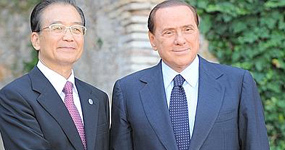
为了欢迎中国总理到访,意大利用象征共产党的红色灯光照亮罗马竞技场,这一决定突显出该国对温家宝的来访有多么重视。
意大利以这一不同寻常之举欢迎温家宝逾五年来首次访问之际,正值意大利(有点紧张不安地)准备迎接对基础设施和高科技合资项目的大规模投资大幅增加,希望以此换取意大利企业在中国赢得平等待遇。
温家宝和意大利总理西尔维奥•贝卢斯科尼(Silvio Berlusconi)周四宣布,两国都有雄心到2015年使双边贸易额增至1000亿美元,重点放在提振投资上。
但是,正如资深中国观察人士所相信的,如果北京方面有意通过意大利——以及(在更小程度上)希腊——构建通往欧洲的战略门户,相关计划必须首先战胜意大利以迟缓和惩罚性出名的官僚体系,这个体系以往曾吓退不少外国投资者。
温家宝周四对意大利商业领袖发表讲话时,承诺将尊重知识产权——他称其为“公民美德”——并给予在华意大利企业国民待遇,这些话赢得了掌声。身为亿万富翁媒体大亨的贝卢斯科尼抓住温家宝的话,指出这意味着在投标中国的项目和与中国的官僚及司法体系打交道时得到平等对待。
就像在温家宝本周早些时候访问的希腊一样,中国内地和香港公司正积极扩张对当地港口和其它基础设施的所有权,并对这些设施进行开发。
和记黄埔(Hutchison Whampoa)正为投资5亿欧元(合6.9亿美元)开发意大利南部塔兰托(Taranto)港而与该国官僚机构的拖延作斗争;国有的中远集团(Cosco)正在扩建那不勒斯港;而总部位于海南的航空和物流集团海航(HNA),正就一个30亿欧元的项目进行谈判,该项目涉及在罗马北部的奇维塔韦基亚(Civitavecchia)新建一座航站楼。
一名外交官把中国企业的这些行动称为“一个国家安全问题,(中方)巴不得控制整条生产链”,与中国投资建设巴基斯坦、缅甸和非洲的港口如出一辙。
中国在发展中国家的重心一直是争取原材料和粮食供应,而意大利的吸引力在于其工程和高技术行业,尤其是可再生能源。温家宝特别指出,意大利的长处在于“设计、创新和创造力”,以及该国充满活力的小企业。
在周四签署的10宗商业协议中,有两宗涉及中国企业进入意大利宽带通信行业:华为(Huawei)与沃达丰意大利(Vodafone Italia)扩大合作,中兴通讯(ZTE)与意大利运营商Tiscali签约。
白色家电和汽车行业发生的事件,突显出变化中的格局。
意大利家电冠军企业意黛喜(Indesit)一年前退出中国,而它原来的中国合作伙伴海尔(Haier)正在意大利北部大举投资建设其首家欧洲工厂。
海尔意大利及希腊业务总经理吉安卢卡•迪彼得罗(Gianluca Di Pietro)表示,该公司力求到2014年跻身欧洲前五大白色家电生产商之列。“以全球领导地位为目标的任何大企业,都必然把欧盟视为自己增长道路上的一个天然组成部分,”他表示。
汽车制造商菲亚特(Fiat)拟在明年放弃其在西西里(Sicily)的工厂,该计划已引起奇瑞(Chery)等中国企业的兴趣。
译者/和风
http://www.ftchinese.com/story/001034911

Italy’s decision to illuminate Rome’s Colosseum in communist red for the visit of the Chinese premier sent the strongest possible signal as to the importance it placed on the trip.
The unusual move in honour of Wen Jiabao’s first visit in more than five years comes as Italy prepares – somewhat nervously – for a surge in large-scale investment in infrastructure and high-tech joint ventures, hoping in exchange to win equal treatment for Italian companies in China.
Wen Jiabao and Silvio Berlusconi, his Italian counterpart, on Thursday revealed joint ambitions to more than double bilateral trade to $100bn by 2015, with the focus on boosting investment.
But if – as veteran China-watchers believe – Beijing intends to build a strategic gateway into Europe through Italy, and to a lesser extent Greece, then those plans must first overcome Italy’s notoriously slow and punitive bureaucratic system, which has deterred many a foreign investor before.
Addressing Italy’s business leaders on Thursday, Mr Wen drew applause with promises to respect intellectual property rights, which he described as a “great civic virtue”, and put Italian companies on an equal footing with their Chinese counterparts. That point was seized upon by Mr Berlusconi, a billionaire media magnate, who noted this would mean equality in applying for Chinese tenders and dealing with China’s bureaucracy and legal system.
Just as they have in Greece, which Mr Wen visited earlier in the week, Chinese and Hong Kong companies are actively expanding into ownership and development of ports and other infrastructure.
Hutchison Whampoa is fighting bureaucratic delays to invest €500m ($690m) in developing Italy’s southern port of Taranto; state-owned Cosco is expanding the port of Naples; and HNA, a Hainan-based aviation and logistics group, is in €3bn talks to build a new terminal near Civitavecchia, north of Rome.
One diplomat described it as a “national security concern, an obsession with controlling the whole chain of production” that mirrors China’s investment in ports in Pakistan, Burma and Africa.
While China’s focus in developing countries has been to secure raw materials and food supplies, Italy is attractive for its engineering and high-tech sectors, particularly renewable energy. Mr Wen noted in particular Italy’s strength in “design, innovation and creativity” and its dynamic small enterprises.
Among the 10 business deals signed on Thursday, two involved Chinese moves into Italy’s broadband sector, with Huawei expanding its co-operation with Vodafone Italia and ZTE linking up with Tiscali.
The changing dynamics are illustrated by events in the white goods and automotive sectors.
Indesit, Italy’s champion of household goods, pulled out of China a year ago, while Haier, its former Chinese partner, is investing heavily in its first European plant in northern Italy.
Gianluca Di Pietro, Haier’s general manager for Italy and Greece, says it aims to be among the top five white goods producers in Europe by 2014. “Any of the big companies who aim at a global leadership must see the EU as a natural part of their growth journey,” he said.
Carmaker Fiat’s plans to abandon its plant in Sicily next year have led to expressions of interest from China’s Taihe and Chery.
http://www.ftchinese.com/story/001034911/en
没有评论:
发表评论